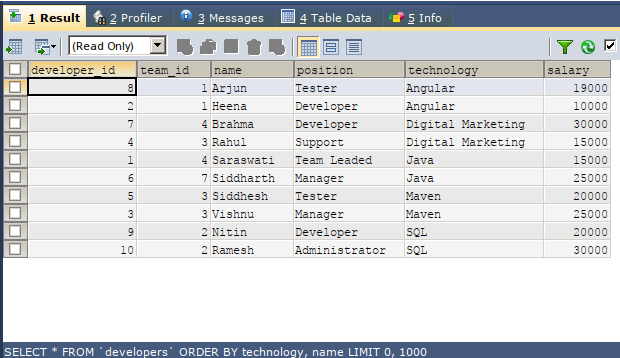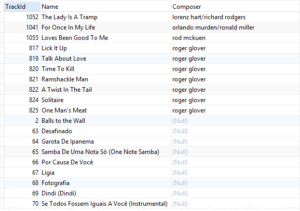

- #Android sqlite order by asc upgrade
- #Android sqlite order by asc for android
- #Android sqlite order by asc android
- #Android sqlite order by asc code
For example, you can simply open your database, then call SELECT load_extension('') to register the collation, and the go on as normal. In practice that is not a problem as long as you load the extension prior to executing any statements that will use the collations.

#Android sqlite order by asc android
For an index on a single column, this means it can be used to sort in both ASC and DESC order. Step 1 Create a new project in Android Studio, go to File New Project and fill all required details to create a new project. It is true that collations may be used in schema. SQLite can scan an index in both directions. That function is called automatically by when the extension is loaded, thus registering the collation. You basically just need to call sqlite3_create_collation_v2 from within sqlite3_extension_init.
#Android sqlite order by asc for android
What makes you say that it will crash? Does older versions of SqlCipher for Android use private libraries that are not made temporarily - a collation can be defined via loadable extension. And a logcat message and a dialog message is displayed as promised above. Works as expected, but you receive a logcat warning.Īnd for Future Android platform behavior:Īnd I tested this, and I see that old versions of SqlCipher works perfectly on the N emulator. Works as expected, but you receive a logcat warning and a message on the target device. N Developer Preview behavior for apps targetting 23 or lower is defined as: See the row Private (temporarily accessible private libraries) here So the app will not target 24 as I said above.
'SELECT FROM ' +#Android sqlite order by asc code
We will set compileSdkVersion to 24 however, we will set targetSdkVersion to 23. Please Check the below code its working for me.

#Android sqlite order by asc upgrade
You should upgrade to the latest library (currently 3.5.2) if your application needs to run on Android N.Īre you sure about this? Let me be more clear: The best thing to do is either change the format of.

Requirement – Fetch emp_name, salary, manager_id details of all employees from employee_details table in ascending order of relative position of salary column in result-set.Please note that older versions of SQLCipher for Android will crash on Android N (API 24). This will change the format of the date to YYYYMMDD in the order by argument: Cursor cursor getContentResolver ().query ( EventEntry.CONTENTURI, projection, null, null, 'substr (date, 7) substr (date, 4, 2) substr (date, 1, 2) ASC') But the problem of date comparing will remain. Scenario – Fetch rows in ascending order of a column by relative position. The query was as follows – SELECT emp_name, designation, salary, dept_id FROM employee_details Requirement – Fetch emp_name, designation, salary, dept_id details of all employees from employee_details table in ascending order of designation and descending order of salary. Scenario – Fetch rows in ascending order of a column and descending order of another column. The query was as follows – SELECT emp_name, designation, dept_id FROM employee_details Requirement – Fetch emp_name, designation, dept_id details of all employees from employee table in ascending order of designation and dept_id. Scenario – Fetch rows in ascending order using multiple columns. The query was as follows – SELECT emp_name, designation FROM employee_detailsīy executing above query, we can get results as shown below – emp_name Requirement – Fetch emp_name, designation details of all employees from employee table in ascending order of designation. Scenario – Fetch rows in ascending order using column.


 0 kommentar(er)
0 kommentar(er)
